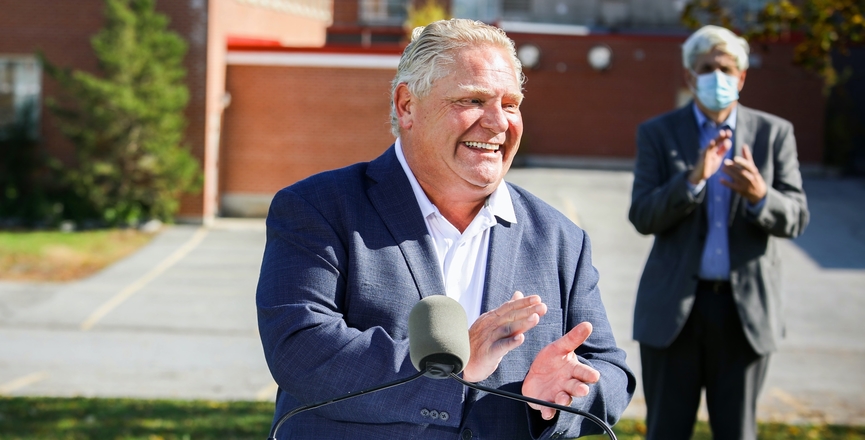No doubt, in his quiet moments, Doug Ford can still hear the boos echoing across Nathan Phillips Square.
It may seem like a lifetime ago — that carefree day in pre-pandemic times when two million Ontarians crowded into downtown Toronto to celebrate the victorious Raptors — but Premier Ford is unlikely to ever forget the unmistakable jeering that followed his introduction.
One of the key things that had made him so wildly unpopular on that day back in June 2019 was his move toward defunding — no, not police — but something more precious to Ontarians: public education.
There had been widespread anger over the government’s announcement a few months earlier that it planned to increase class sizes throughout the province (enlarging high school classes from 22 to 28 students and eliminating 3,500 teachers) and to force students to take online courses.
These moves, designed to cut $850 million out of provincial education spending, weren’t mentioned during the election campaign and were clearly seen as putting the interests of students behind business demands for deficit-reduction.
Now, little more than a year later, the pandemic has allowed the Conservative premier to dramatically transform his image from a bully siding with big business to kindly uncle Doug.
Meanwhile, underfunding is contributing to the high stress in schools today, with parents so worried about crowded classrooms during the pandemic that many are keeping their children at home or sending them to private schools or study groups.
And, as Ontario’s deficit rises due to the pandemic, public schools are likely to be seen as prime targets for future deficit-reduction by a premier who, like former Conservative premier Mike Harris, is determined to cut public programs and force us to rely more on the marketplace to meet our needs.
That Harris agenda is already being freshly primed and peddled by business groups that likely have Ford’s ear — like the right-wing Fraser Institute, which urges Ontario to limit spending on public schools and extend support to private schools.
For now, however, the newly popular, soft-spoken premier is trying to convince us that he has morphed into a champion of public schools, proclaiming in late August: “We have done absolutely everything, everything … We’re sparing nothing. Every idea possible, we’re putting into the classrooms.”
In fact, Ford has failed to do the most important thing to make our schools safer during the pandemic — guarantee smaller class sizes, making social distancing possible.
His government rejected demands to limit classes to 15 students. Some classes now have as many as 30.
COVID aside, smaller classes, by allowing teachers to devote more individual attention to students, have long been seen as a bedrock principle of good education.
But the Ford government has never seemed particularly interested in such bedrock principles, according to a secret internal document obtained last January by Star reporters Rob Ferguson and Kristin Rushowy.
Rather than demonstrating a commitment to “do absolutely everything, everything” to support our public schools, the document reveals a profit-oriented approach to education that sounds straight out of a corporate boardroom.
Along with plans to cut funding to school boards, the document expressed dissatisfaction that “the [public school] system does not generate any revenue for the province.”
The document suggests developing “a business model” for producing online courses that could be marketed to other jurisdictions so “maximum revenue generation may be realized.”
Since when is public education about “maximum revenue generation” — rather than about educating our children, instilling in them civic values and respect for others, and helping them develop into adults who can fully participate in our economy and our democracy? Why is this government so keen to turn the crucial institution of public education into a profit-making centre?
Ontarians deeply value our public programs, with public health care and public education the most revered.
We don’t want these programs defunded or used as profit centres. We want them treated as vital public goods, dedicated to the task of improving the well-being of all of us.
So let’s not forget that, behind his new kindly uncle demeanour, Doug Ford is the same guy who was heartily booed last year by the largest-ever gathering of Ontarians. And for good reason.
Linda McQuaig is a journalist and author. Her book Shooting the Hippo: Death by Deficit and Other Canadian Myths was among the books selected by the Literary Review of Canada as the “25 most influential Canadian books of the past 25 years.” This column originally appeared in the Toronto Star.
Image: Doug Ford/Twitter



